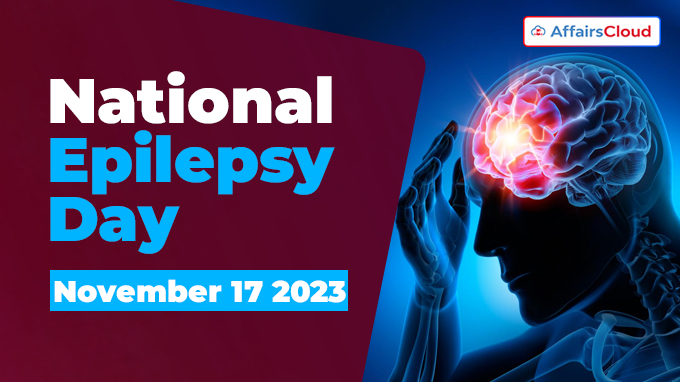 National Epilepsy Day is annually observed across India on 17 November to spread awareness and educate people about Epilepsy, a neurological disorder characterized by recurrent seizures, and its impact on individuals, families, and communities who are affected by this disease.
National Epilepsy Day is annually observed across India on 17 November to spread awareness and educate people about Epilepsy, a neurological disorder characterized by recurrent seizures, and its impact on individuals, families, and communities who are affected by this disease.
- The day serves as a platform to eliminate myths and misconceptions surrounding epilepsy while creating awareness about its symptoms and management.
Symbol:
Purple is the colour of Epilepsy and the Symbol of Epilepsy is the Purple Ribbon.
- The Purple Ribbon also represents the Pancreatic cancer.
Background:
During the General Body Meeting of the Indian Epilepsy Association (IEA) held at Indore, Madhya Pradesh, held on 17th December 1990, it was decided to celebrate 17th November of every year as the National Epilepsy Day.
- The observance was proposed by Dr. Eddie Bharucha and Dr. Piloo Bharucha, an Indian Physician couple.
Related Observances:
i.Purple Day: An international grassroots effort observed annually on 26 March to increase awareness about epilepsy worldwide.
ii.International Epilepsy Day: It is annually observed across the globe on the 2nd Monday of February to promote awareness of epilepsy.
iii.National Epilepsy Awareness Month (NEAM): NEAM occurs every year in November.
- This month-long observance is observed each year in the United States of America (USA).
What is Epilepsy?
i.Epilepsy is a chronic Non-Communicable Disease (NCD) of the brain that affects people of all ages.
ii.It is characterized by recurrent seizures, which are brief episodes of involuntary movement.
- Seizures are sudden surges of abnormal and excessive electrical activity in your brain and can affect how you appear or act.
iii.Types: Seizures can be partial (part of the body) or generalized (entire body).
Key Facts:
i.According to the World Health Organisation (WHO), around 50 million people worldwide have epilepsy, making it one of the most common neurological diseases globally.
- In India, more than 10 million patients are suffering from Epilepsy, which is 10-20% out of 50 million worldwide.
- Nearly 80% of people with epilepsy live in low-and middle-income countries.
iii.It is estimated that up to 70% of people living with epilepsy could live seizure-free if properly diagnosed and treated.
Response of WHO:
i.The 75th World Health Assembly (WHA) held in Geneva, Switzerland, on 22-28 May 2022 adopted the Intersectoral Global Action Plan on epilepsy and other neurological disorders 2022–2031.
ii.Highlighting the importance of combined approaches, the plan emphasises the integration of pharmaceutical and psychosocial interventions between epilepsy and other neurological disorders.
About Epilepsy Foundation of India:
Founder– Dr. Nirmal Surya
Headquarters– Mumbai, Maharashtra
Founded in- 2009.
The Epilepsy Foundation is a non-profit charitable organisation that helps people suffering from this condition.




